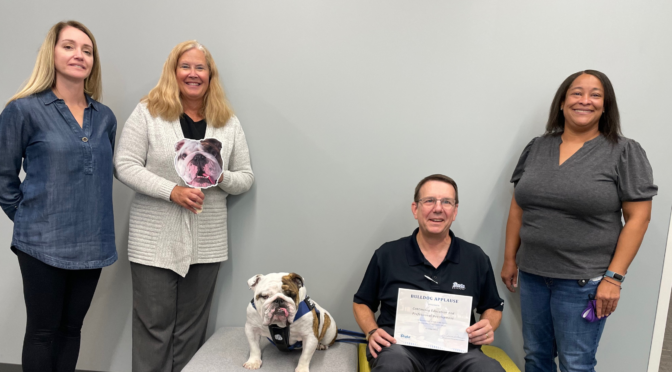Please join us in congratulating the September recipients of the True Blue Award. Here is a little information about our honorees with excerpts from their nominations.
Helen Frizel and Charnelle Harris, Catering, Sodexo
“Char and Helen along with Sky, the student worker, went above and beyond to make sure we had what we needed. They were kind and patient. They clearly communicated changes and asked many questions to make sure they got it just right. The whole team was outstanding all week.”
Alice Fynaardt, Administrative Assistant, Biology
“She has created a feeling of community within the College’s admin assistants. She always gets right back to me with correct information and good feedback and is cheerful about doing so, even when she herself is busy. She is an information sharer, and she wants all of us to succeed in our jobs.”
Mary Beth Holtey, Assistant Dean, College of Arts & Sciences
“During Welcome Weekend, we had a last-minute cancellation, leaving one of our departments without staff to speak with students. Without hesitation, Mary Beth ran the departmental overview, which lasts over an hour, with less than a 30-minute warning. She is truly a wonderful part of the Drake community, who is here to help at the drop of a hat and wants what is best for our students.”
Korrine Jackson & Heather Winslow, Payroll Coordinator & Admin. Services Specialist, Payroll & Finance
“Heather and Korrine are a delight to work with for payroll. They offer great communication and are team players for the betterment of Drake. Since payroll is a deadline-driven process, they offer quick updates and responses to ensure that everyone at Drake is paid correctly and in a timely fashion – something we don’t consider in our daily work at Drake because it is handled so seamlessly behind the scenes.”
Brandi Miller, Assistant Director, New Student Programs, Student Financial Planning
“More specifically, Brandi is a leader in serving Black staff and faculty on campus, to build a sense of belonging and voice. She organizes the Black affinity group and has been a strong voice in bringing forward issues and concerns. Brandi’s steadfast leadership demonstrates integrity and purpose. We are lucky to have her at Drake.”
Kara Vaughn, Associate Director of Annual Giving, University Advancement
“Kara epitomizes Drake’s core values every day. She is one of the first to raise a hand or jump in to help when needed. She is a cheerleader for her teammates – she celebrates successes and offers empathy during difficult times. She is a friend to all on our team and makes every effort to make others feel welcome and included.”
Do you know of a staff member or department that has gone above and beyond to exemplify True Blue spirit? Nominate them today!
— Betsy Wilson, On behalf of All Staff Council

